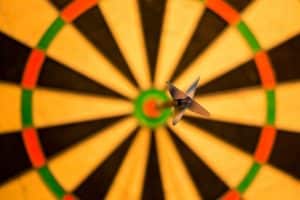Learner-Centered Tip of the Week: Going Back to the Targets
CompetencyWorks Blog
 This post originally appeared on Courtney Belolan’s website on March 28, 2016. Belolan is the instructional coach for RSU2 in Maine.
This post originally appeared on Courtney Belolan’s website on March 28, 2016. Belolan is the instructional coach for RSU2 in Maine.
One of the first things people share with me since coming to RSU2 in September is a frustration with learning targets. This is something I hear in every school, in every grade level, and in every content area. It isn’t that people don’t understand the point of them, quite the contrary. It is that people understand the point of them so well that they now see the need to improve them. Here are the most common points I hear:
- The progressions of targets don’t always make sense.
- The target itself is really hard to understand.
- Foundational pieces are missing.
- There is a lack of consistency around how the target is interpreted.
- It isn’t always clear how to “exceed” on a target.
Most of the Measurement Topics and Targets we are using were drafted and adopted about six years ago when the district first switched to a proficiency-based system. It was a classic Voltaire moment, not letting “the perfect be the enemy of the good.” Or, if you prefer sports, a Nike “Just Do it” moment.
Now, six years and a whole lot of growth later, we are realizing just how “not perfect” those Measurement Topics and Targets are. In order to make them what we want them to be, we have to take a step back in our understanding of Targets and Measurement Topics. And it is extremely important that we do. Learning Targets and Measurement Topics make personalized learning possible.
Here in RSU 2, we use the following definitions and explanations:
Learning Target: the skills, knowledge, and reasoning processes required for learners to achieve proficiency of each measurement topic. Student learning and teacher facilitation is focused on the learning target.
- Learning targets are fully defined with a complete Scoring Guide
- Learning targets are either declarative or procedural
- Level 3 of the target is considered meeting
- Level 2 of the target is considered to be foundational knowledge
- Level 4 of the target is the same level 3 target with more complex reasoning
- Assessments and tasks are evidence of proficiency towards a target
- Targets are assessed and scored using a body of evidence from a student
Measurement Topic: the summary of the learning targets in a strand within a content area.
- Learning targets string together from simple to complex to build a measurement topic
- Measurements Topics do not always have one target for each traditional “grade level.”
- Measurement Topics do not always start in pre-K or Kindergarten, nor do they always end in 12th grade
- Measurement Topics steps and levels are not connected to “grade levels”
These are the absolute basics of how Learning Targets and Measurement Topics work. There are several other important pieces to working with Learning Targets and Measurement Topics. Stay tuned for a video post (a vlog…what?) about the difference between procedural and declarative targets…
See also:
- Learner-Centered Tip of the Week: Connecting Learning Targets
- Learner-Centered Tip of the Week: Increasing Engagement
- Learner-Centered Tip of the Week: Reining in the Checklist Mindset
Courtney Belolan works at RSU 2 in Maine where she supports K-12 teachers with performance-based, individualized learning. Courtney works closely with teams and teachers as a coach, and with the school and district leadership teams as an instructional strategist. Courtney has worked as a 6-12 literacy and instructional coach, a middle level ELA teacher, an environmental educator, and a digital literacy coach. Her core beliefs include the idea that the best education is one centered on student passions and rooted in interdisciplinary applications, and that enjoying learning is just as important as the learning itself.